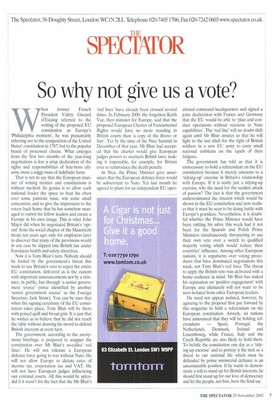So why not we us a vote?
When former French President Valery Giscard d'Estaing referred to the writing of the proposed EU constitution as Europe's 'Philadelphia moment', he was presumably referring not to the composition of the United States' constitution in 1787, but to the popular brand of processed cheese. What emerges from the first two months of the year-long negotiations is less a crisp declaration of the rights and responsibilities of free-born citizens, more a soggy mass of indefinite form.
That is not to say that the European manner of writing treaties and constitutions is without method. Its genius is to allow each national leader the space to beat his chest over some patriotic issue, win some small concession, and so give the impression to the voters back home that he has somehow managed to outwit his fellow leaders and create a Europe in his own image. This is what John Major did when he negotiated Britain's 'optout' from the social chapter of the Maastricht treaty ten years ago; only for employers later to discover that many of the provisions would in any case be slipped into British law under European health and safety directives.
Now it is Tony Blair's turn. Nobody should be fooled by the government's threat this week to use Britain's veto to reject the entire EU constitution, delivered as is the custom with important announcements not by a minister, in public, but through 'a senior government source' (since identified by another 'senior government source' as the Foreign Secretary Jack Straw). You can be sure that when the signing ceremony of the EU constitution takes place, Tony Blair will be there with poised quill and broad grin. It is just that he wishes us to believe that he did not reach the table without drawing his sword to defend British interests at every turn.
The government, according to the anonymous briefings, is prepared to scupper the constitution over Mr Blair's so-called 'red lines'. He will not tolerate a European defence force going to war without Nato. He will not allow Europe to dictate rates of income tax, corporation tax and VAT. He will not have European judges influencing our criminal courts. All this would be splendid if it wasn't for the fact that the Mr Blair's 'red lines' have already been crossed several times. In February 2000, the forgotten Keith Vaz, then minister for Europe, said that the proposed European Charter of Fundamental Rights would have no more standing in British courts than 'a copy of the Beano or Sun'. Yet by the time of the Nice Summit in December of that year, Mr Blair had accepted that the charter would give European judges powers to overturn British laws; making it impossible, for example, for Britain ever to reintroduce the death penalty.
At Nice, the Prime Minister gave assurances that the European defence force would be subservient to Nato. Yet last month he agreed to plans for an independent EU oper ational command headquarters and signed a joint declaration with France and Germany that the EU would be able to 'plan and conduct operations without recourse to Nato capabilities'. The 'red line' will no doubt shift again until Mr Blair assures us that he will fight to the last ditch for the right of British soldiers in a new EU army to carry small national emblems on the lapels of their fatigues.
The government has told us that it is unnecessary to hold a referendum on the EU constitution because it merely amounts to a 'tidying-up' exercise in Britain's relationship with Europe. If it is really just a tidying-up exercise, why the need for the sudden attack of passion? The fact is that the government underestimated the interest which would be shown in the EU constitution and now realises that it must be seen to be doing battle with Europe's grandees. Nevertheless, it is doubtful whether the Prime Minister would have been rattling his sabre this week had it not been for the Spanish and Polish Prime Ministers simultaneously threatening to use their own veto over a switch to qualified majority voting which would reduce their countries' influence. Among other European nations, it is arguments over voting procedures that have dominated negotiations this week, not Tony Blair's red lines. The threat to apply the British veto was delivered with a home audience in mind. Mr Blair has staked his reputation on 'positive engagement' with Europe and ultimately will not want to be seen isolated from other European leaders.
He need not appear isolated, however, by agreeing to the proposal first put forward by this magazine to hold a referendum on the European constitution. Already, six nations have announced that they will be holding referendums — Spain, Portugal, the Netherlands, Denmark, Ireland and Luxembourg, while France, Italy and the Czech Republic are also likely to hold them. To belittle the constitution one day as a 'tidying-up exercise' and to portray it the next as a threat to our national life which must be defended by prime ministerial defiance is an unsustainable position. If he wants to demonstrate a will to stand up for British interests, he should first stand up for our love of democracy and let the people, not him, have the final say.


























































































 Previous page
Previous page